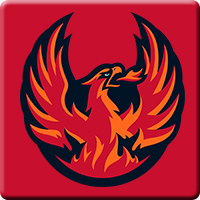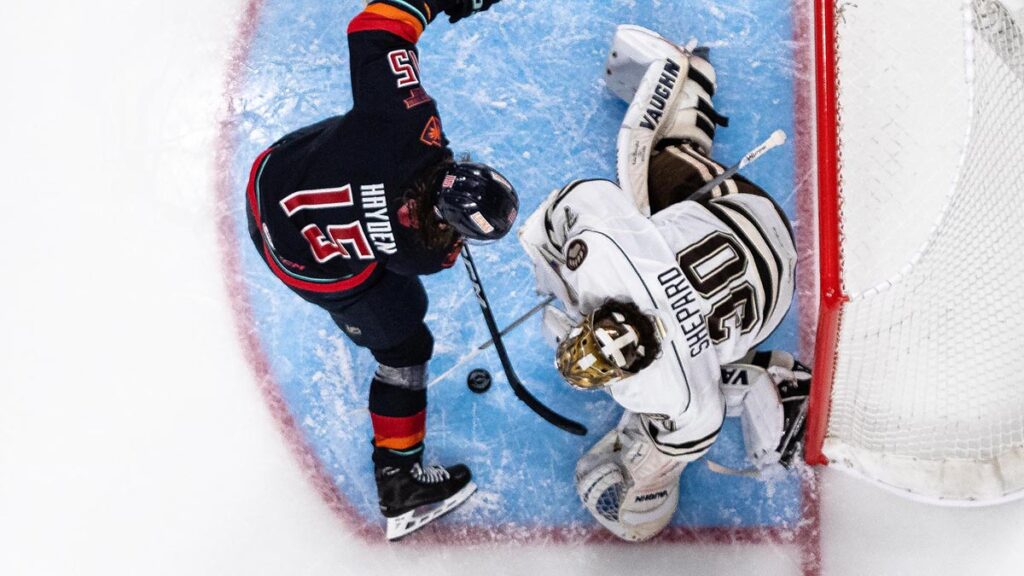 Firebirds rookie forward Shane Wright was a full practice participant yesterday at Giant Center.
Firebirds rookie forward Shane Wright was a full practice participant yesterday at Giant Center.
Wright, the fourth overall pick in the 2022 NHL Draft, missed the entire Western Conference Finals against Milwaukee being injured in Game 3 of the team’s division final with Ontario on May 17. He has a pair of goals to go with three assists through six playoff games.
“We got some good time off,” Firebirds head coach Dan Bylsma said after practice. “[Wright] was pushing to get back in Games 4 and 5 of the last series, and he was close. You see him skate out there the last few days with us, and [he] looks pretty comfortable out there, and hopefully we can get him in the lineup.”
Named to the 2023-24 AHL Top Prospects Team yesterday, Wright finished with 47 points (22 goals, 25 assists) in 59 games during the regular season. He also earned eight games with the Seattle Kraken and put up four goals and an assist.
Said Wright, “I hate watching games. Any athlete can relate to that. You always want to be playing, so definitely a little more motivation for me going out there.”
 After finishing the Western Conference Finals in Milwaukee last Saturday, the Firebirds headed directly to Hershey.
After finishing the Western Conference Finals in Milwaukee last Saturday, the Firebirds headed directly to Hershey.
Bylsma said that plan was by design. With the outcome of the Eastern Conference series still in doubt at the time, the Firebirds opted to go to Hershey and stay in the eastern part of the country rather than fly back to the West Coast and wait out the rest of the matchup between the Bears and Monsters. If Cleveland had won, the Firebirds would have headed home to host Game 1.
They used the week productively. Along with on-ice work, the coaching staff took in Games 6 and 7 at Giant Center. To break up the week for the players, the team rented a vacation home approximately 45 minutes away from Hershey. The players worked together there to prepare a team dinner, did some fishing and got to explore the Pennsylvania outdoors. The home also featured a sauna and cold tub, and the itinerary also included watching Game 2 of the Stanley Cup Final.
“I think it was actually a pretty productive week,” Andrew Poturalski, a two-time Calder Cup champion, said. “We made the most out of it. It was a unique situation, but we had fun, and now we’re ready to go.”
 Bylsma and Hershey head coach Todd Nelson have a Calder Cup history that dates back 30 years.
Bylsma and Hershey head coach Todd Nelson have a Calder Cup history that dates back 30 years.
As players, they met in the Finals in 1994 when Nelson’s Portland Pirates bested Bylsma and the Moncton Hawks in six games.
They then faced off as assistant coaches in 2008, with Nelson and the Chicago Wolves winning the Calder Cup against Bylsma and the Wilkes-Barre/Scranton Penguins.
Then last spring, they met as head coaches in the classic seven-game series between the Bears and Firebirds.
“Nelly is a guy I know more personally from back when we were playing, and he was in Grand Rapids and summered in Grand Rapids,” said Bylsma, a West Michigan native. “[We] played summer hockey together, the occasional golf game, and whatnot.
“He’s got the upper hand in every situation so far that I bumped into him. I certainly know that, but this is not about Nelly and [me]. Good luck on him, and we’ll be shaking hands (at the end of the series) one way or another.”
 Nelson did not have an immediate update on defenseman Vincent Iorio after Game 7 of the Eastern Conference Finals.
Nelson did not have an immediate update on defenseman Vincent Iorio after Game 7 of the Eastern Conference Finals.
Iorio exited during the game and did not return, and Hershey’s blue line was already without veterans Lucas Johansen and Aaron Ness. To supplement the roster, the Bears added defenseman Colin Swoyer from South Carolina, their ECHL affiliate, on Thursday. Swoyer, 26, played four regular-season games with the Bears and had three assists. He also logged 36 games with Wilkes-Barre/Scranton last season and registered a goal and 10 assists.
With the quick turnaround between series, the Bears opted to rest yesterday.

The Eastern Conference Finals between Hershey and Cleveland were the most attended series in Calder Cup Playoff history.
Total attendance was 80,467 fans for the seven games between Giant Center and Rocket Mortgage FieldHouse. Cleveland finished its postseason run averaging 12,233 fans over seven home games, an AHL record for a single playoff year.
The previous record was held by the Bears and Manitoba Moose, who drew 77,038 fans to the six-game Calder Cup Finals in 2009.
― with files from Patrick Williams



